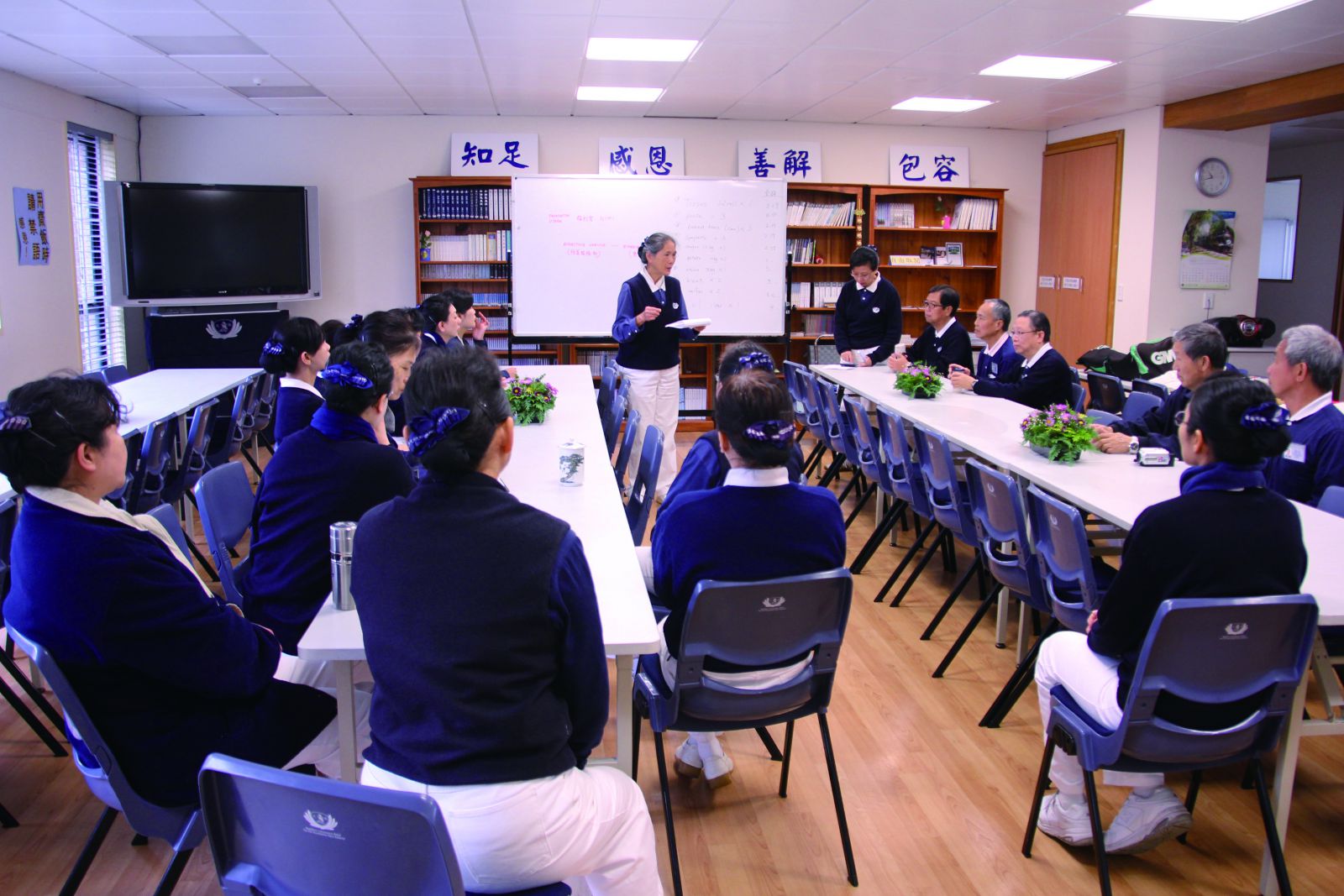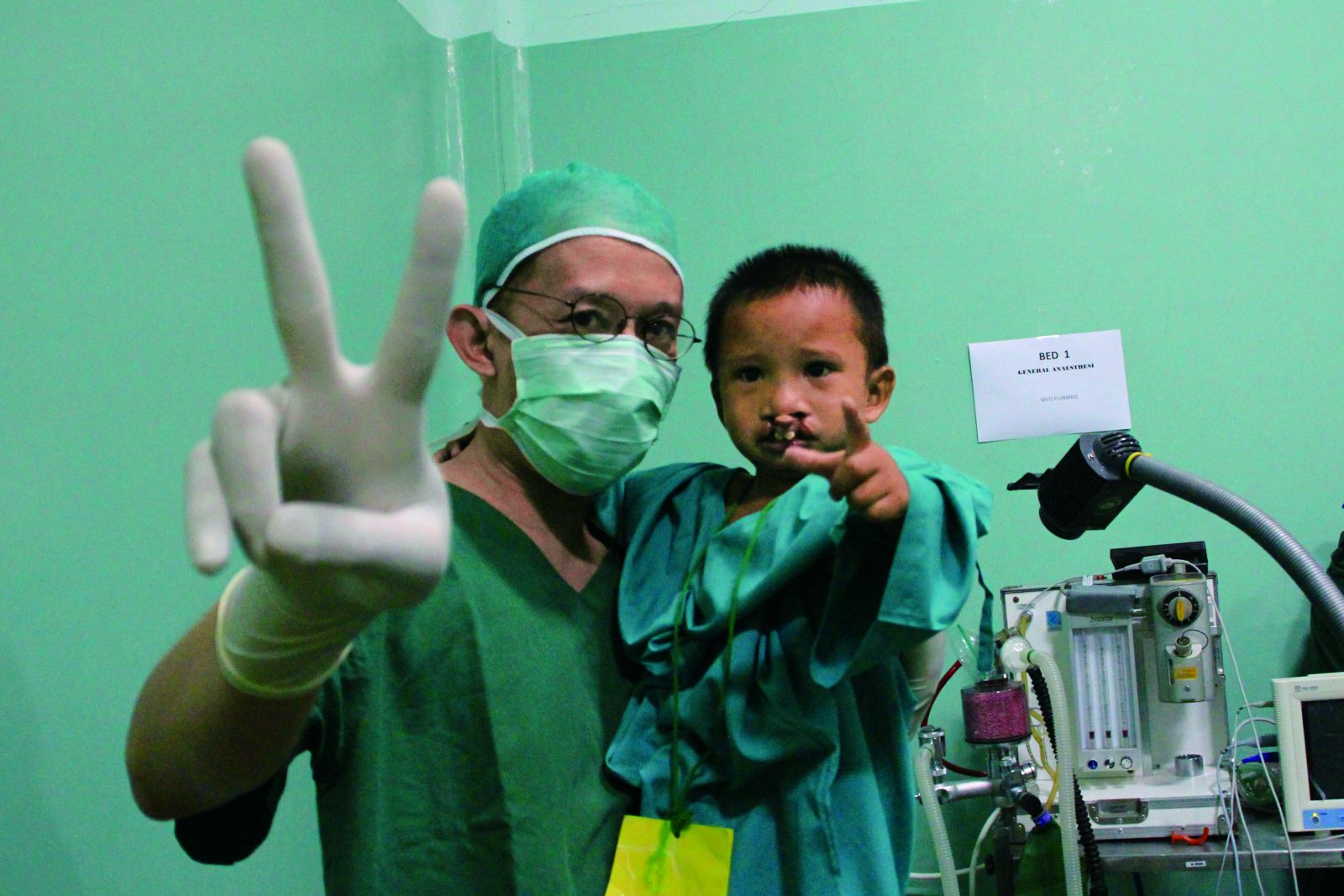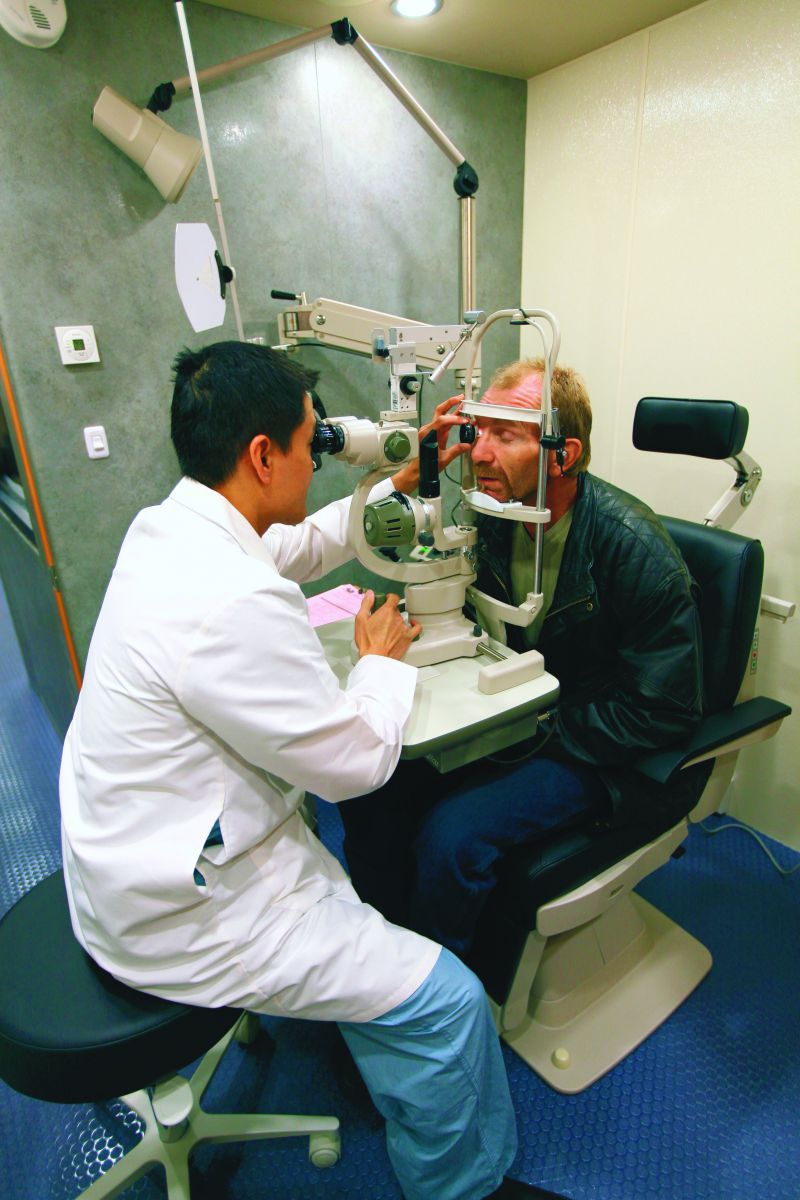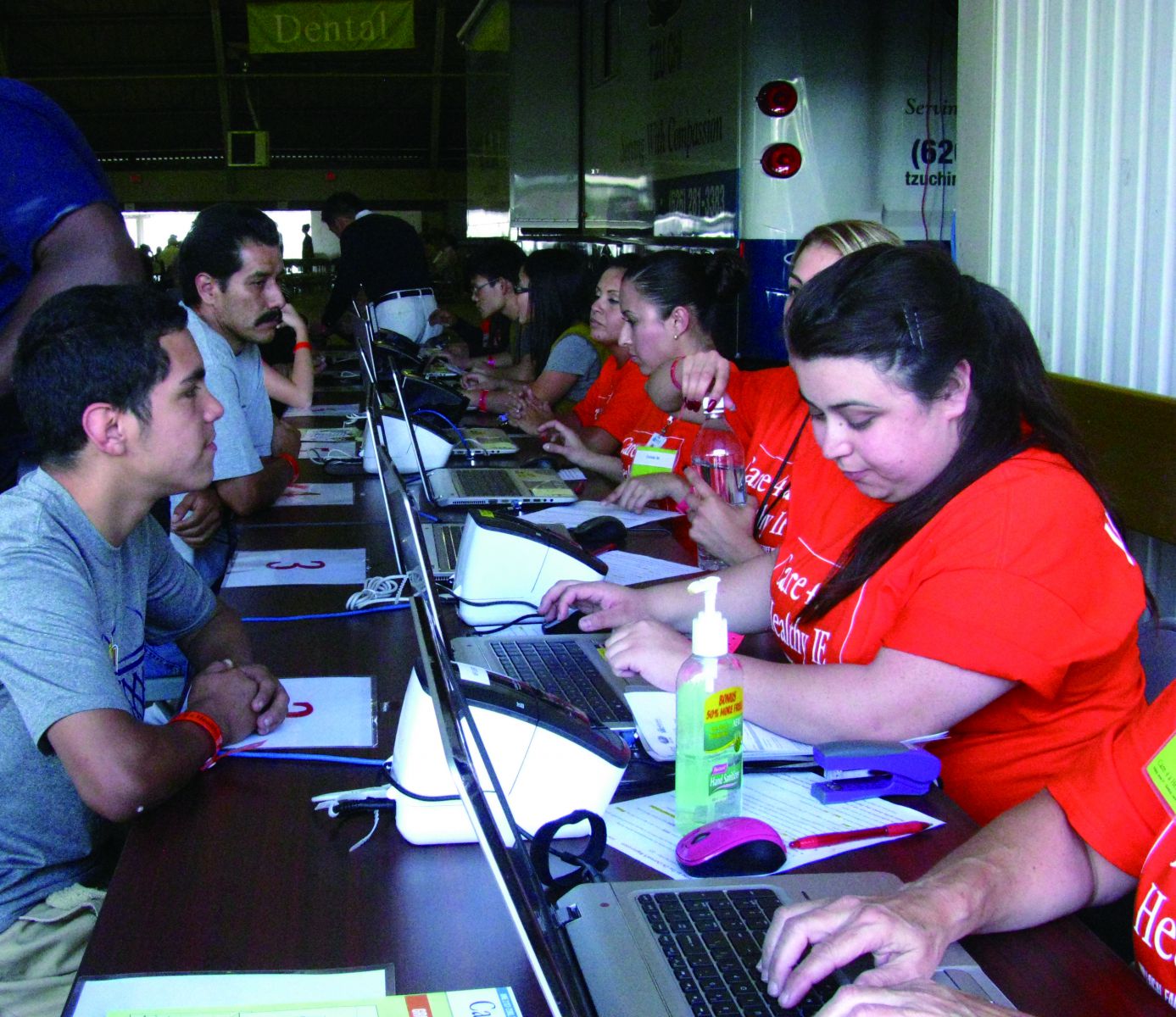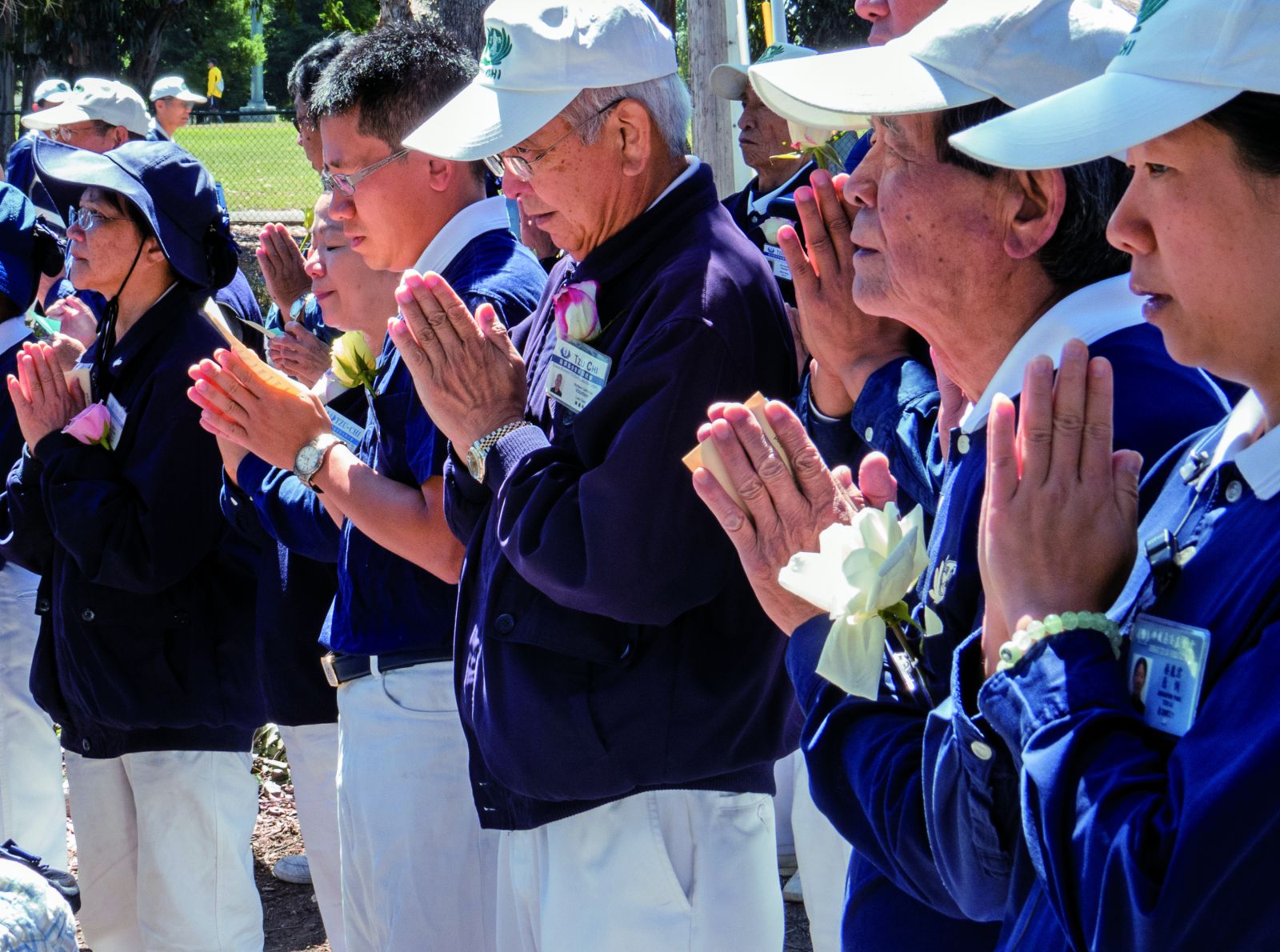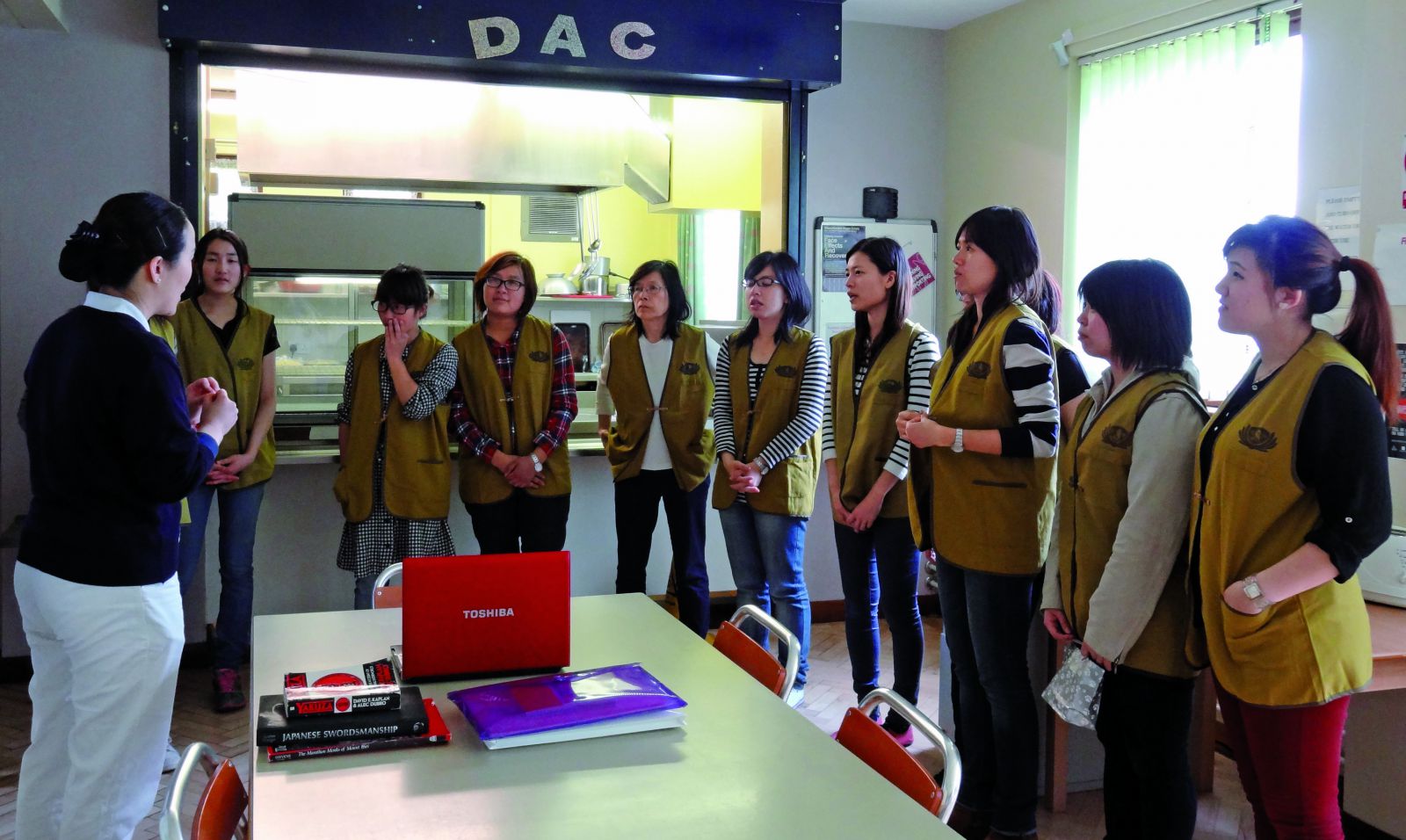

| Tzu Chi Events Around the World | ||||||||||||||
Thailand Lakkhana and her younger brother, Phiraphon, have been raised since they were little by their maternal grandparents, Somboon and Sa-Nguan. Their mother gave birth to them when she herself was underage, and she soon abandoned them. Grandpa Somboon has been sick a lot, so Sa-Nguan has been the primary breadwinner of the family. Although their financial situation is strained, the young sister and brother have done well enough at school to earn Tzu Chi scholarships. One day in May, Tzu Chi volunteers visited the family in their home, located in a narrow alley in Khlong Toei, Bangkok. They found the house standing precariously, leaning to one side, its rotting roof supported by old, worn wooden beams. Water from a sewage ditch ran directly through the house. The volunteers had to bend down in order to get into the house, taking care to avoid the darting cockroaches and rats. The ramshackle condition of the house prompted volunteers to rebuild the home for the family. Volunteers first rented a place for the family to live during the rebuilding process. Then, on June 30, construction workers and volunteers tore down the dilapidated shack. Neighbors and several Tzu Chi scholarship recipients in the neighborhood helped to haul away the debris and waste with wheelbarrows. Somboon, 71, visited the site often during the construction. “I’m old, and I couldn’t do anything about our old house,” he said. “Living there was like sitting on a ticking bomb—we were on pins and needles every day. Never in my dreams did I ever think that a new home would be possible for us. You’re truly bodhisattvas.” The new home was completed in three weeks. It has windows on opposite walls to allow air circulation, and it has an indoor bathroom. (The family’s bathroom used to be located outside, behind the old house.) After volunteers helped paint the house, everyone sat on the floor, chatting and laughing. Two teachers from Lakkhana and Phiraphon’s school also came to visit the new house. Benja Ruangsamer is a respected teacher with more than 30 years in the profession. She was grateful to Tzu Chi for helping the family, and she reminded Lakkhana to take good care of the house and to learn to be an upright person. Lakkhana has long been a recycling volunteer in the community, and her grandmother also volunteers for Tzu Chi. The old woman said thankfully, “Tzu Chi volunteers not only built a new home for us, but they also bring us daily necessities. I’ll urge my grandchildren to work harder at their schoolwork, and we’ll all do what we can to help others as a way to give back to society.”
New Zealand The government of New Zealand has a good social welfare system that takes care of its less fortunate citizens, but the assistance does not always cover the needs of poor families. To help out, Tzu Chi joined forces with Community Development and Safety, South Auckland, and Otara Budgeting Service and began distributing food to needy families every two weeks. The first distribution was held on June 12. The Otara Budgeting Service was founded by the New Zealand government to help low-income families plan family budgets. People with financial problems have often come here for help, so the service maintains a list of needy families. Tzu Chi New Zealand offers assistance to those on the list. On June 10, many volunteers gathered at the local Tzu Chi office to package food in preparation for the distribution. Aid items included spaghetti, spaghetti sauce, cream-style canned corn, biscuits, cooking oil, sugar, onions, and potatoes, as well as toilet paper. A local supermarket, owned by Cai Mei-hong (蔡美虹) and her husband, provided the onions and potatoes to Tzu Chi below cost. Cai, originally from Taiwan, said happily that they have operated the store for eight years, and that when they heard about the distribution, they took the opportunity to support Tzu Chi and give back to society. On the morning of June 12, eight volunteers went to the Otara Budgeting Service for the first food distribution. Rakanui Tangi and others at the Budgeting Service had contacted and arranged for 25 families to come to pick up the food packages. During the distribution, volunteers offered to carry food to the cars of recipients. Their gentleness softened the awkwardness between the recipients and the volunteers, and many families thanked them for the gesture. On behalf of the Budgeting Service and the families, Tangi thanked Tzu Chi for the distribution, which certainly made life a little easier for the recipient families.
Indonesia The Indonesia Tzu Chi branch, in cooperation with Indonesian police, held a free clinic from June 21 to 23 at RS. Polri Kramat Jati Hospital in Jakarta. This was the 91st free clinic conducted by the branch. The event logged 1,703 clinic visits in internal medicine, dentistry, and surgery. At the venue, a woman named Nurmini and her husband, Barudin, waited anxiously as their son was being operated on. Two-year-old Ahmad Rikaffi had been born with a cleft lip, but the couple had not been able to afford surgery to correct the problem. When they heard about the free clinic, they decided to take their boy there, their hearts full of hope. The family is from Bekasi, West Java. They live in a crude, simple house with walls of woven bamboo and a dirt floor. They sleep on a plastic sheet on the floor. The husband collects and sells recyclables for a living, bringing home about 20,000 rupiahs (US$1.83) a day. With such a low income, the family can barely get by. Surgery to correct their boy’s condition was just not possible. Dewi Sartika, from a neighboring village, felt sorry for the boy, so as soon as she heard about the free clinic, she helped the couple sign up for it. Nurmini started a fast three days before the free clinic and prayed to Allah that the surgery would be a success. When the boy was brought out from surgery, the parents were happy and relieved that the operation had gone well. Dewi was also very happy to have helped the boy. Isep Hidayatullah, 10, was another young patient who benefited from the free clinic. One day when he was eight months old, he accidentally bumped into a table when he was crawling around, and a bottle full of hot water fell on him. He sustained severe burns on parts of his body. His father, Tatang, took him to a doctor, and spent all the money he had on skin grafts for the boy. But the fingers on the baby’s right hand had become stuck to the palm. The doctor dressed the wound and asked Tatang to bring his son back in three days to see how the wound was healing. Unfortunately, unable to afford further medical treatment, Tatung didn’t take his son back to the doctor, and Isep ended up with a deformed right hand. As the boy grew older, his friends mocked him because of the deformity, and sometimes he would come home crying. His father blamed himself for his son’s suffering. The injured hand was corrected by surgery at the free clinic. “If it hadn’t been for the Tzu Chi free clinic, I would have felt awful and deeply guilty every time I thought about what my son would have to face in the future,” said Tatang. Now, with his hand recovering, Isep can pursue his dream of serving in the army when he grows up.
The United States From June 21 to 23, 2013, the Tzu Chi Medical Foundation held a free clinic in conjunction with Molina Medical at the National Orange Show Events Center in San Bernardino, California. Tzu Chi deployed their Dental Mobile Clinic and the Vision Mobile Clinic for the event. The county has suffered high unemployment in recent years. House foreclosures are prevalent, and more and more residents are in need of help. Tzu Chi has held small-scale free clinics for the needy in San Bernardino for 18 years. This was the second large-scale free clinic the foundation had conducted in the area. The event marked the first time that Tzu Chi used its Vision Mobile Clinic, fully equipped with optometry equipment. Patients could have their eyes examined as well as their eyeglasses made, right on site. Volunteer Jiang Rong-he (江榮和) and his wife, Chen Shu-yun (陳淑雲), donated all the eyeglasses provided to the patients during this event. Jiang said that he had been in the business of manufacturing glasses for years. “I’m glad that Tzu Chi now has this van to treat people who have eye problems but can’t afford the insurance,” said Jiang. Vision and dental care is largely excluded from general health insurance in the United States. Therefore, free services in ophthalmology and dentistry were particularly popular at this event. Dr. Sam Yel, a retired ophthalmologist, attentively examined every patient. A patient remarked that his eyes got tired easily from reading newspapers or magazines, so he simply stopped reading them. Now, with his new prescription eyeglasses, he believed the situation would greatly improve. Yel had originally planned to volunteer at the event for just one day, but after seeing how many patients needed to be served, he decided to come all three days. He even declined to take breaks because he did not want patients to wait any longer than necessary. Dr. Kwang-Soon Chung was born in North Korea. He said that his parents had taken him and escaped to South Korea when he was one year old. His family later immigrated to the United States, where he received a good education and became a dentist. Three years ago, he saw a Tzu Chi Dental Mobile Clinic by chance and jotted down the phone number on the vehicle. When he retired, he wanted to do something for society, so he contacted Tzu Chi and became a volunteer. He told several dental assistant trainees working in the free clinic that it was costly to learn dental skills and to become a dentist or a dental assistant. Now that they had a chance to learn those skills for free, he advised them to cherish the opportunity. Than Kyaw, a young American of Burmese descent, received a Tzu Chi scholarship three years ago, when he started high school. This year, he won another scholarship from Tzu Chi, and he will go to the University of California, San Diego, in September. He came to volunteer at the free clinic because he had heard that many volunteers would be needed for the event. He also invited his sister to come along. Ruthy Argumedo, associate vice president at Molina Medical, stated that she had known Tzu Chi for ten years, and for the last six years her group had worked with the foundation and provided free medical services in places like Lytle Creek Elementary School and Lucky Farms, both in San Bernardino. She was happy to work with Tzu Chi again at this event. Over 200 Tzu Chi volunteers served more than 2,000 patients during the three-day event. Overall, there were 4,831 patient examinations in the clinics for general medicine, Chinese medicine, dentistry and eye exams.
The United States Asiana Airlines flight 214 from Seoul crash-landed at the San Francisco International Airport on July 6, killing three passengers and wounding 181 people on board. Nearly one week after the accident, the government still had not opened up any channel for Tzu Chi or other groups to offer direct help to the victims and their families. Tzu Chi volunteers decided to hold a prayer service for the victims. Working with the local Red Cross chapter, volunteers in San Francisco organized the July 13 prayer event with help from other volunteers in Oakland, Cupertino, San Jose, and Fremont. For the event, they chose a small park by the Crowne Plaza Hotel near the airport where the families of the victims were staying. Coincidentally, volunteers had delivered copies of Jing Si Aphorisms and Tzu Chi Monthly to that hotel on July 5, the day before the plane crash. The prayer service started at 11 in the morning of July 13 with brief remarks from Qiu Qiong-zi (邱瓊姿), the master of ceremonies, and Xie Ming-jin (謝明晉), CEO of Tzu Chi Northern California. Xie invited everyone to observe a minute of silence for the deceased. Reverend Andrew Kille, chairperson of the Silicon Valley Interreligious Council, then led a Christian prayer. Master Jian Ang of the Zen Center of Sunnyvale also prayed for the deceased in fluent English. The parents of two of the deceased victims were present at the prayer ceremony. So overcome with emotion that they couldn’t speak, they stood on stage while a friend spoke on their behalf to thank the people in attendance. The parents bowed to everyone. Many people were in tears. Then Xie led everyone in singing a Tzu Chi song, “Love and Care for All.” After volunteers and the three parents offered flowers to the deceased, the volunteers formed two lines and warmly hugged the parents.
Britain Women’s Direct Access in Manchester is a public temporary shelter for disadvantaged women, including victims of domestic violence. Tzu Chi volunteers have gone there regularly for three years to give care to the residents. Volunteers visited the shelter on June 15. Despite the approaching summer vacation, many students signed up to volunteer for the visit. Veteran volunteer Wang Yi-chieh (王以潔) made work assignments and shared tips with the other volunteers, some of them first-time participants, and the group set to work. They first started an origami session with the residents in attendance. Together, they folded paper into small containers and boxes. Residents enthusiastically enjoyed the activity. Gradually the air of unfamiliarity melted away, and laughter was heard from time to time. Then the volunteers led the residents in singing a Tzu Chi song, “One Family,” with accompanying sign language motions. The residents cheerfully followed the hand gestures of the volunteers. At lunch time, Tzu Chi volunteers offered tomato basil soup, cheese noodle casserole, salad, fruit, and desserts. The food was particularly welcomed by the residents because the short-staffed shelter did not provide regular meals and the women often had to take care of their meals by themselves. The food the volunteers prepared gave the residents a feel and a taste of family cooking, something that many of them had not had for a long time. There were several new volunteers in the group. They wanted to chat with the abused women, but they were concerned that such conversations might open old wounds. Wang taught the novices how to get such conversations started. Feeling the sincerity of the volunteers, some residents opened up and shared their painful pasts with the visitors, who listened attentively and compassionately. Many volunteers said afterwards that the visit helped them realize how fortunate they were to live in nice, warm homes without violence. They also promised that they would continue to care for the battered women in the shelter and help set them free from the grip of their old pain so they might start their lives anew.
|
















|

.jpg)
